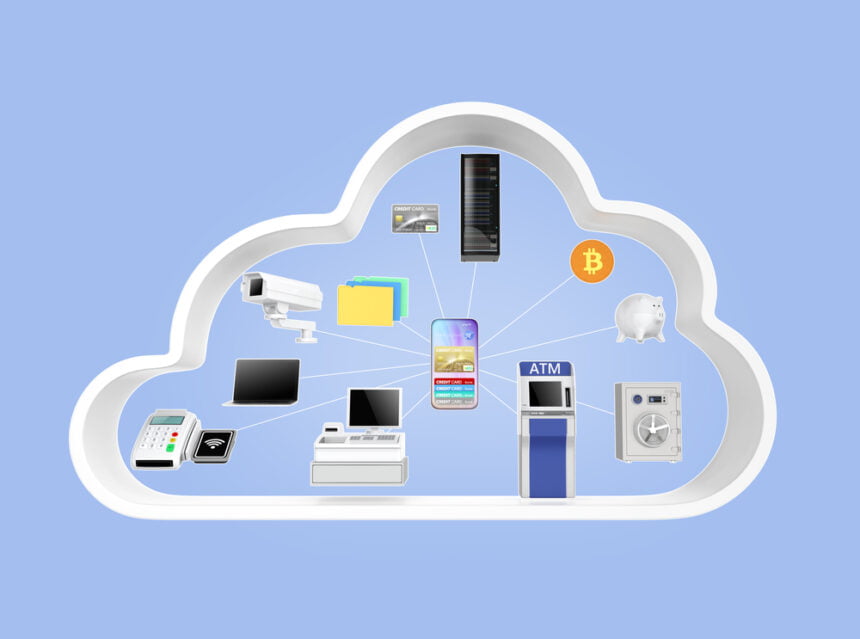Cloud technology is one of the most impactful developments of the 21st Century. Analysts found that global organizations spent $41.8 billion on cloud infrastructure in the first quarter of 2021 alone.
Many major companies have already moved to the cloud and discovered the benefits of doing so. However, some organizations are still unsure of what measures they should take to adapt to the cloud. They might be skeptical of some of the benefits as well. These companies will be more likely to adapt and start investing in cloud technology if they have a better understanding of the advantages that it offers.
Here is a quick question.
If you are asked to exchange your POS system with hundreds of new customers for your e-commerce store, would you say yes to the deal?
Probably not.
If there is one tool keeping your store up and running smoothly, it is your POS system. Bartering it for a few hundred new customers wouldn’t make a difference if you cannot deliver those customers a hassle-free shopping experience. Will it?
So, when the POS system is critical for your business growth and sustainability, why not take it to the next level?
A cloud-based POS system exactly helps you to achieve that.
Integrating inventory operations, marketing, sales, and customer management, brings the best of all worlds. But to know exactly how, you have to read on.
7 Benefits a cloud-based POS system can give your business in 2022
In a heavily disrupted world by the Covid-19, a cloud-based POS system is no longer just a growth hacking strategy. It is a foundational need irrespective of your business size.
Integrating a cloud-based system is the way how future businesses deliver their consumers the complete shopping experience without interacting in a physical environment.
To do so, it deploys multi-level automation to operations in an e-commerce store. What follows is you suddenly experience a spike in the productivity and efficiency of your employees.
The best part?
You have more creative time to innovate inside your organization.
However, to experience the full power of a cloud-based POS system, you need to ensure you choose the right tool. If your software is not robust, you end up doing more bad than good to your process. Lightspeed is a powerful tool to consider here.
In the following section, we give you a deep dive into the top benefits that a powerful cloud-based POS system can render to your business.
Spoiler alert? Lightspeed has each of the following features.
1. It gives you universal accessibility
Managing an e-commerce store is a complex process. This makes efficient team communication indispensable for smooth operations. A cloud-based POS system precisely addresses this need.
Centralizing your database, the tool not only helps you use data for more optimal business decisions but also improves the data transparency and visibility of your entire organization. No matter if you have a single point of sale or multiple, you can access your management floor remotely from anywhere.
Here are a few ways how this feature can transform your operations.
2. Builds your dream team
The cloud-based POS system can boost the productivity of your employees exponentially.
Unlike legacy-based systems, a cloud system enables your team real-time access to reports on what is going on your work floor. The best part?
They can update information related to their operations, schedules, and tasks whenever they want, from wherever they want.
3. It helps declutter your workspace
One of the biggest benefits of cloud technology is that is helps remove workloads from local servers. In fact, one survey found this is the single biggest reason that organizations move to the cloud, with 70% saying that they intend to move resources to the cloud to reduce workloads.
Data management is one of the most crucial elements when it comes to running an e-commerce store.
Be it lead generation reports, SOPs (standard operating procedure), productivity reports, or monthly sales reports, it manages it all.
The best part?
You can update any information from anywhere without immediately notify each member. No matter how many reiterations you undergo, all of your team members will be kept on the same page.
4. Keeps your store running
Your next customer might be lingering just around the corner, but if you fail to deliver what they are looking for, you lose money on the table.
Inventory management is no doubt critical for an e-commerce store. A cloud-based POS system ensures that you never miss out on keeping track of your inventory.
From inventory counts, reordering inventory, triggering promotional prices to labor usage percentages, you can do it all. It is ideal when you need either a single store location or multiple. Its centralized system keeps you updated.
The best part?
You can enjoy heavy automation on these tasks.
5. Easy maintenance
Updates and upgrades are an integral part of any software maintenance. After all, it is what keeps the application in top performance.
However, unlike on-premise POS systems, keeping your software fresh is much easier with a cloud-based POS system. Its centralized, cloud-based software keeps you ahead of the curve.
With this tool, automatic updates are a common phenomenon.
Updating a single device is sufficient to update the entire chain linked to the software. That is a huge time saver. It ensures there are no communication inconsistencies due to any workflow disruption.
Yet another distinguishable feature for cloud-based POS systems is that their upgrades occur at a much higher frequency than traditional legacy systems.
6. Enhanced security
There is so much sensitive information that your online store handles in a day.
From user transaction information, personal details to your payment system information, so much information needs protection.
In such an ecosystem, can you afford to take the security of such information lightly? No matter how many safety protocols you adhere to, digital products are always vulnerable to data breaches. One way or the other, hackers try to find a way to acquire unauthorized access. Hence, it is important for organizations to implement critical data security strategies to keep off cyber attacks.
With a cloud-based POS system, your data security has safety insurance. Unlike on-premise software, the security system of a cloud POS system is much more advanced and comprehensive.
From encryption technology to strong firewalls, cloud-based software takes multiple measures to safeguard your data from the hands of hackers. Yet that is not all a cloud-based POS does for your e-store.
There is more. You do not need to worry about losing your data with a cloud-based system. Unlike local servers, storing data in a cloud server is way safer.
Even if you lose data on your device, your central system always has a backup of the data. This means 360-degree security for all your data.
7. Enhanced customer success
All POS systems’ performance comes down to one core factor: usability. If your teams cannot use it, it does not matter. This makes customer support a key element to what you can achieve with the software in the long term.
A cloud POS system is way better than an on-premise POS system with post-sales support when it comes to customer support.
With on-premise software, you get into purchasing a one-off product.
Here, even if your software provides great post-sale service, the maximum support you get here comes in FAQ sections and DIY tutorials.
But with a cloud-based POS system, this support runs deeper.
Utilizing the SaaS-based model, a cloud-based POS has an ongoing journey with its customer. This ensures they give you high levels of attention to solve your problem day in, day out.
To do this, they install real-time customer support and deploy AI-enabled assistance. This ensures your questions are answered in the best possible way whenever you want, wherever you want.
Sometimes these support experiences also have bilingual experts who make it easier for you to do the job. Fix your problem.
8. Improved scalability
The cloud-based POS system is designed for scalability.
With a transparent, ongoing pricing system, a cloud-based POS system ensures you can customize your requirements as you scale.
The best part is it supports your cost optimization venture. This means you pay only for what you use.
Unlike legacy systems, cloud POS systems keep the pricing lean and recurring. This can help your company reallocate resources in more critical areas like inventory stocking. So if you are removing on a tight budget, a cloud POS is any day better than on-premise systems.
9. Reduced costs
If the benefits of a cloud-based POS system could not convince you to invest in the tool, its cost efficiency definitely will.
Its all-over costs are much cheaper than in-premise POS systems, from installation to maintenance. Here’s how?
Utilizing the democratizing SaaS model tends to make the product’s price point much cheaper and ongoing. In addition, this helps to personalize the demand of the product in real-time. The best part?
It supports your business to scale.
Yet again, the additional system setup costs for the POS system are significantly cheaper when it is cloud-based. After all, with the cloud, a huge part of the system is taken care of for you.
Again, when it comes to upgrades, the cloud-based software helps to stay ahead of the herd at zero to minimal costs.
Unlike traditional legacy service providers, cloud-based software updates automatically at no added costs, opposite to legacy software.
When you face an occasional technical malfunction in a legacy POS system, the issue is usually unique to your process. Unfortunately, this means the service provider may take longer to fix the problem while costing you some significant service charges down the line.
With cloud-based POS, it is never the case.
If there is a glitch, it is faced universally amongst its users and fixed by the provider at no extra cost from the users.
Cloud-Based Systems Offer Many Distinct Advantages
A cloud-based system can prove to be one of your best business decisions for the coming year.
Not only does it have the capability to transform your business into a growth hacking machine but helps you reallocate your resources for maximum ROI (return on investment).
Whatever tool you choose, ensure it can support your dynamic business needs. No matter where you are now, a startup or an enterprise, it must be able to support your ambitious goals.







